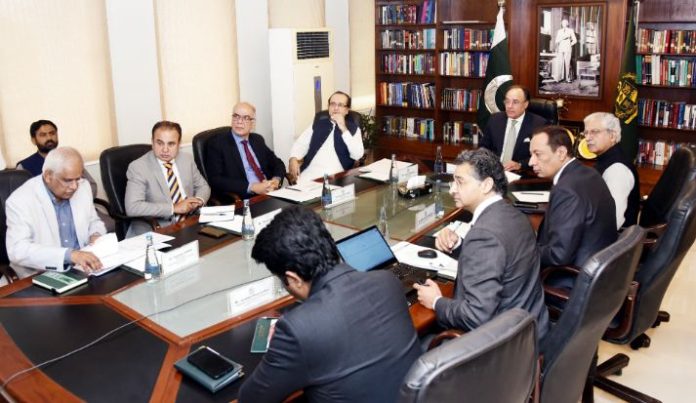ISLAMABAD, MAY 27 /DNA/ – Federal Minister for Finance and Revenue, Senator Muhammad Aurangzeb, today chaired a high-level meeting to review the progress on outcome-based funding initiatives recommended by the Committee on Social Impact Finance, a body constituted by the Prime Minister to spearhead innovative and inclusive financial solutions in Pakistan.
The meeting brought together senior representatives from Pakistan’s financial sector, including commercial banks, development finance institutions (DFIs), regulators, and investment experts, who form the core of the MOF-led Task Force. The session marked a follow-up to the recently concluded two-day Impact Financing Workshop and Training, held in the federal capital and organized by the Ministry of Finance in collaboration with Karandaaz Pakistan and the Pakistan Banks Association (PBA) under the theme ‘From Value to Vision: Financing with Purpose from Pakistan’s Financial Sector’.
The workshop, inaugurated by Finance Minister Senator Muhammad Aurangzeb, covered key topics such as strategic intent in financing, impact governance, portfolio-level impact design, outcomes at exit, and independent validation. Through interactive case studies, peer-learning engagements, and scenario-based exercises, participants developed actionable strategies to embed impact into financial decision-making processes.
During today’s review session, the Task Force presented detailed findings and recommendations focused on steering the financial sector towards sustainable, inclusive, and impact-driven innovation. Central to the discussions was the Social Impact Financing (SIF) Framework, a comprehensive model co-developed with experts from health, poverty alleviation, and skills development sectors under the aegis of the Ministry of Finance. The framework lays out six priority pillars and is designed to mobilize private sector capital towards verified, outcome-based public good initiatives.
The Task Force emphasized that Outcome-Based Financing (OBF) represents a transformative shift from input-oriented funding models to results-linked investments. By tying disbursements to independently validated outcomes, OBF seeks to enhance transparency, accountability, and efficiency across Pakistan’s development finance architecture. This model has the potential to unlock both private and philanthropic capital, directly address delivery challenges, and ensure smarter targeting of resources.
Five prototype OBF initiatives were showcased to the Minister, including:
- Graduation of ultra-poor, female-headed households out of poverty within five years.
- Enhanced income generation for farmers through agronomic support.
- Financial inclusion and poverty alleviation via agri-warehousing.
- Social impact financing in the healthcare sector.
- Human capital development through skills training and employment-linked education.
The Task Force highlighted that the SIF Framework is a strategic blueprint aligned with the Sustainable Development Goals (SDGs), aiming to blend financial returns with measurable social outcomes. It recommends the creation of innovative financial instruments, de-risking solutions, and incentive mechanisms to attract long-term private sector participation in development.
In his remarks, Finance Minister Senator Muhammad Aurangzeb expressed appreciation for the Task Force’s collaborative efforts and emphasized the critical role of private capital in catalyzing macroeconomic transformation. He noted the interconnected nature of healthcare and wellbeing with all six priority development pillars, and underscored human capital development as central to the country’s sustainable growth agenda. He also stressed the need for upskilling and re-tooling of the workforce to meet emerging industry demands, suggesting closer integration between economic activity and vocational training.
The meeting concluded with a commitment to take forward the Task Force’s recommendations for presentation to the Prime Minister for policy integration, institutional mainstreaming, and piloting of selected OBF models.

















